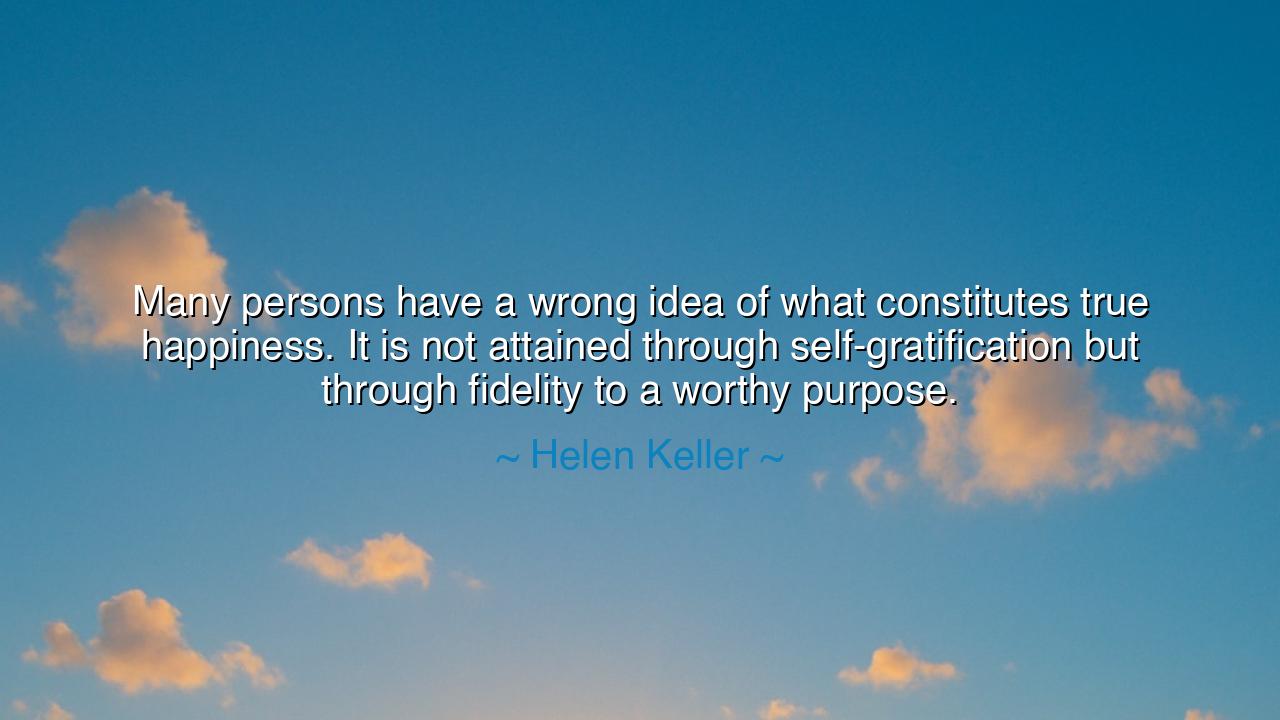
Many persons have a wrong idea of what constitutes true
Many persons have a wrong idea of what constitutes true happiness. It is not attained through self-gratification but through fidelity to a worthy purpose.






“Many persons have a wrong idea of what constitutes true happiness. It is not attained through self-gratification but through fidelity to a worthy purpose.”
Thus spoke Helen Keller, a woman whose life itself was a luminous testament to the triumph of spirit over limitation. In this simple yet profound statement, she reveals the great secret of fulfillment — that true happiness is not born from pleasure, wealth, or comfort, but from devotion to something greater than oneself. It is the calling of the soul, not the satisfaction of the senses, that gives life its deepest meaning. Her words rise like a clear bell through the noise of modern life, reminding us that the joy which endures is not the joy that is taken, but the joy that is given.
The origin of these words lies in Keller’s extraordinary life — one marked not by ease, but by struggle. Born both blind and deaf, she was locked for years in darkness and silence, until the light of understanding broke through the touch of her teacher, Anne Sullivan. From that awakening, Keller did not turn inward toward bitterness or self-pity; she turned outward toward purpose. She studied, wrote, and spoke across the world, becoming a voice for those who could not speak for themselves — the poor, the disabled, the oppressed. She knew, as few do, that self-gratification fades swiftly, but service to a noble cause endures. Her happiness was forged not from what she received, but from what she gave.
To seek happiness in self-gratification is to chase the horizon — the more one runs toward it, the farther it recedes. Pleasure is fleeting; the appetite for it, endless. Many live their lives as prisoners of desire, mistaking indulgence for joy, and comfort for peace. But Keller teaches us that happiness is not a treasure to be seized; it is a flame that must be kindled by purpose. It is found when one’s actions align with one’s values, when the heart serves something enduring — truth, justice, compassion, creation. To live thus is to rise above the narrow walls of self and dwell in the vastness of meaning.
History, too, bears witness to this truth. Consider Florence Nightingale, who walked the wards of war-torn hospitals by candlelight, tending to the wounded while others slept. She could have chosen wealth or comfort, but she chose service — and in doing so, found a happiness that no luxury could equal. Or think of Mahatma Gandhi, who surrendered personal ease for the struggle of a nation, fasting, walking, and speaking for freedom. These souls understood what Keller proclaimed: that fidelity to a worthy purpose transforms even suffering into joy, for when the soul serves what is right, every hardship becomes holy.
And what, then, is this “worthy purpose”? It is not always grand, nor must it be celebrated by the world. For some, it may be the raising of a child in love; for others, the creation of beauty through art; for still others, the quiet labor of healing, teaching, or defending truth. What matters is not the scale of the purpose, but the sincerity of devotion. Fidelity — the steadfastness of the heart — is what sanctifies the work. When we give ourselves wholly to something that uplifts, we become greater than we were. The river of self-interest runs shallow; the river of service runs deep and clear.
Keller’s insight carries both comfort and challenge. Comfort, because it tells us that even the smallest life can be radiant with meaning; challenge, because it demands that we rise above the pursuit of pleasure and convenience. To live for a worthy purpose is to live deliberately — to choose love over selfishness, courage over comfort, and truth over ease. The world may not reward such living, but the soul will. For in serving others, we encounter our truest selves; in losing ourselves, we are found.
So, my child, take this teaching as you would take a lamp into the dark. When you seek happiness, do not look to possessions, praise, or power — these are shadows that fade. Instead, ask: What purpose calls to me? What good can I serve? Then give yourself to it with all the fidelity of your heart. Work not for reward, but for the joy of the work itself. For as Helen Keller discovered, even in a world without sight or sound, one can find immeasurable light — not by taking from life, but by giving oneself to it.
And when your journey grows long and the world feels cold, remember her wisdom: true happiness is not the fruit of self-gratification, but the blossom of purpose. Seek not what pleases you, but what strengthens and ennobles you. Be faithful to that purpose, and your life, however humble, will shine with the quiet, enduring light that only love and service can create.






AAdministratorAdministrator
Welcome, honored guests. Please leave a comment, we will respond soon